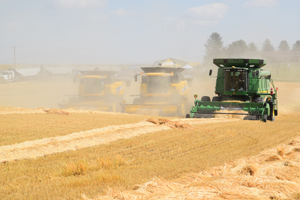Current Temperature
30.4°C
County updated on RDAR program targeting sustainable practices
Posted on April 5, 2023 by Sunny South News Sunny South File Photo
Sunny South File Photo By Erika Mathieu
Sunny South News
Lethbridge County’s Agricultural Service Board (ASB) has received an update on the On-Farm Climate Action Fund, (OFCAF), and how the program is supporting sustainable farm practices.
As part of the March 27 Lethbridge County ASB meeting, Cropping System Specialist, Rob Dunn, provided the Board with information on OFCAF, and how the non-profit organization, Results Driven Agriculture Research (RDAR) administers OFCAF funding to help farmers tackle climate change in Alberta. The funding stream was created to help farmers reduce agricultural Greenhouse Gas (GHG) emissions. Funding for this program has been provided by Agriculture Canada and Agri-Food Canada.
OFCAF was first announced in 2021 as part of the federal budget. The $200-million cash injection falls under the $4 billion Natural Climate Solutions Fund. RDAR was awarded $33 million of the OFCAF funds to provide financial support to producers to accelerate their adoption and implementation of on-farm Beneficial Management Practices (BMPs) with the goal of lowering Greenhouse Gas (GHG) emissions, support production efficiency, sustainability and resiliency on their farm operations.
Funding under the program encompasses three activity categories: Improving nitrogen (N) management, increasing adoption of cover cropping, and expanding the adoption of rotational grazing.
Although the goal is to try to increase adoption of BMFs, funding eligibility is dependent on whether or not the applicant’s proposal supports the adoption of new practices on that land.
“This is one of the frustrations for all of the farmers I work with, because very few are eligible,” Dunn said.
Despite this, Dunn said the program is in demand and that the RDAR staff are trying to (process) applications as quick as possible. “There are 600 plus applications that have hit the queue in the last four weeks.”
Dunn told the Board that previously, the program stipulated applicants must have been granted approval prior to starting the implementation of Beneficial Management Practices (BMFs) approved under the program. Dunn said, “now they are saying you can start without approval, but must recognize as an applicant it might not be approved.”
Dunn said for farmers, especially in central Alberta, where they are dedicating annual crop plans to a season-long grazing mix, the OFCAF funding can cover those species that extend the grazing mix into the late summer and fall. “It doesn’t cover the spring cereals they put in to graze but it covers the other species in that mix that extends it into the season.”
For farmers wanting to adopt rotational grazing Dunn said the program offers a, “great opportunity for those wanting to get into rotational grazing for the first time or on new lands.”
He added discussion relating to spring cereals or peas in a full-season grazing mix has been “a point of controversy. With the program they (Ag Canada) were looking more at cover and soil benefits, not so much grazing.”
Dunn said beyond increasing adoption of cover cropping, and expanding the adoption of rotational grazing, nitrogen management represents the “lion’s share of the funding.”
Dunn added the program has caused some debate amongst producers as to what should and should not be covered under the program.
“Corn for grazing is not eligible. That has caused some hard feelings. Winter cereals planted for grain production isn’t eligible, but if it was used for spring forage it’s fine.”
“Inhibitors are a big part of what Ag Canada would like to see. They have dug in their heals on this and we are only going to fund where people use dual inhibitors.” Dunn said he suspects single-use inhibitors may be included in future years.
All applicants are required to provide “imagery-based description of the project,” for rotational grazing, and said successful applicants are required to sign an attestation and/or provide evidence that the eligible project was completed.
“It’s a great program for those that are eligible. This is trying to get us to the next level and the government is looking hard at how to do that. How do you continue to reward those who are doing good practice(s)? There is a lot of debate right now in the ag industry.”
Farmers interested in applying must connect with a qualified third party, (either a Professional Agronomist or a Certified Crop Advisor) to review and approve the drafted BMP plan.
Results Driven Agriculture Research (RDAR) is a non-profit organization created by the Government of Alberta to further agriculture research which enables producers to set priorities and lead agriculture research. For more information, visit https://rdar.ca/ofcaf/
Leave a Reply
You must be logged in to post a comment.

